Farm protests & Kurien’s Amul offer lessons to be learnt
By RN Bhaskar
On 23 February 2024, the web was flooded with advertisements showing the celebration of the 50th anniversary of Amul, the largest agricultural brand in India (and even Asia). It was the federation of milk cooperatives that Verghese Kurien had created, which in turn collectively sold dairy products under the Amul brand that helped India become the largest producer of milk in the world. That is why most people, except disbelievers, call it Kurien’s Amul.
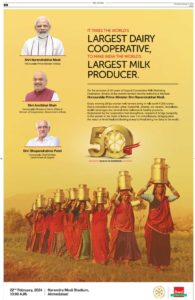 But the advertisements and posters had one very disturbing feature. It showed Prime Minister Narendra Modi, Home Minister Amit Shah and the Gujarat chief minister, Bhupendra Patel. Missing in the display was the man who made this vision a reality – Verghese Kurien. The only publication which remembered Kurien on this occasion was Business Today in an Instagram posting (https://www.instagram.com/business_today/p/C3pYZHEJh0w/?img_index=1). That I decided to use this as the lead picture for this article.
But the advertisements and posters had one very disturbing feature. It showed Prime Minister Narendra Modi, Home Minister Amit Shah and the Gujarat chief minister, Bhupendra Patel. Missing in the display was the man who made this vision a reality – Verghese Kurien. The only publication which remembered Kurien on this occasion was Business Today in an Instagram posting (https://www.instagram.com/business_today/p/C3pYZHEJh0w/?img_index=1). That I decided to use this as the lead picture for this article.
The shock, dismay, even anger was best expressed through these three tweets –
- https://x.com/sandeep_PT/status/1760579890041000080?s=20
- https://x.com/sandeep_PT/status/1760621509213618356?s=20
- https://x.com/sandeep_PT/status/1760929245134503961?s=20 .
Attempts to erase Kurien
The government obviously wanted to erase the memory of Verghese Kurien. This was evident even when NDDB – another brilliant creation of Kurien – hosted the International Dairy Federation’s (IDF’s) World Dairy Summit in September 2022 (https://asiaconverge.com/2022/09/world-dairy-summit-forgets-verghese-kurien/).
Even earlier, Dilip Sanghani, a Gujarat elected representative from the BJP, made the crass remark about Kurien trying to promote Christianity (https://deshgujarat.com/2018/11/24/dr-verghese-kurien-used-to-fund-christian-missionaries-involved-in-religious-conversion-of-poor-people-out-of-amuls-money-sanghani/). This was despite the well-known fact that Kurien was an atheist. He chose to be cremated (not buried) next to the site where his mentor Tribhuvan Patel was cremated (https://indianexpress.com/article/india/ignore-such-remarks-verghese-kuriens-daughter-on-conversion-charge-5464927/). The deliberate attempt to malign Kurien was obvious.
It is when one looks at this development, one can appreciate the anger the farmers have against the government. The farmers’ protest in North India begins to make immense sense. They remind one about the protests in 2022 (https://asiaconverge.com/2021/09/need-sensible-laws-to-stop-farmer-exploitation/). Many of the causes remain the same. And once again, farmers have been confronted with nailed barriers, tear gas and rubber bullets, which only military dictators are known to use.
Causes for farm distress
The reasons for farmer disenchantment and distress are given below:
- The government awarded the Bharat Ratna to MS Swaminathan, for his contribution to the Green Revolution (https://www.pib.gov.in/PressReleasePage.aspx?PRID=2004328). He did a marvellous job. But he achieved this through government funds. Kurien made India the world’s largest producer of milk without a single paise from the government. This was the world’s largest agricultural enterprise to have grown without any subsidy from the government. Yet the government has refused to ward him with the Bharat Ratna. This is despite milk accounting for 4.5% of India’s GDP (many claim it to be a higher 5.6%) as recorded by the Press Information Bureau in March 2023 (https://www.pib.gov.in/PressReleseDetailm.aspx?PRID=1908343). Compare this with a 2% share of GDP for rice and 2.5% for wheat.
- Kurien made India the largest producer of milk in the world by ensuring that foreign dairy supplies would not queer market economics for the farmer. All imported dairy products – milk, casein, butter, even if received as gifts – were taken up by NDDB and released in the market slowly at market prices. They were not allowed to depress market prices. The farmers were thus never subjected to distress sale, or unremunerative prices (https://asiaconverge.com/2021/11/remembering-kurien-and-how-much-the-country-owes-to-him/).
- Milk thus became the first agricultural produce to enjoy (implicitly) a Minimum Support Price (MSP). It was Kurien’s guarantee, without calling it a guarantee – a term much abused nowadays. Yet you hear economists and legislators spout theories about how MSP is a bad idea (https://asiaconverge.com/2021/12/msp-is-a-bad-idea-say-many-economists-really/). In fact, even Tamil Nadu has declared an MSP for milk, knowing how vital it is for farmers.
- The short-sightedness of the government was most evident when it tried to actually sabotage the interests of milk producers by tacitly agreeing to allow diary imports from New Zealand (https://asiaconverge.com/2019/08/indian-bureaucrats-almost-shortsold-the-milk-industry-at-fta-cpec-negotiations/). That prompted R.S.Sodhi, managing director of the Gujarat Cooperative Milk Marketing Federation (GCMMF) to shoot off a letter to the commerce ministry, stating “As the custodian of the interest of 10 crore plus farmers in India, we urge you to keep dairy products out of the (RCEP/FTA) concessions in larger interest of the producers and consumers of our country.” Simultaneously, Sodhi too began his war of tweets to counter the propaganda of the NZ and EU teams (http://www.indiancooperative.com/dairy/sodhi-leads-twitter-war-in-support-of-10-crore-farmers/).
- The manner in which RS Sodhi was eased out of his position – almost overnight – confirmed suspicions that the government was keen on positioning itself as the head of the milk movement – not Sodhi or even Kurien (https://asiaconverge.com/2023/01/sodhis-resignation-has-dire-warnings-for-agriculture-and-milk/). Such fears were proved right when Kurien’s name was sought to be erased first from the NDDB meet in 2022, and this time from the Amul celebrations in February 2024.
- The government’s penchant for imports is well known. It has resorted to import of edible oil and oilseeds (https://asiaconverge.com/2023/01/sodhis-resignation-has-dire-warnings-for-agriculture-and-milk/) thus jeopardizing the revenue earning potential for Indian farmers. It has resorted to pulses imports, even as the farmers increased acreage under pulse-cultivation (https://asiaconverge.com/2017/05/how-pulses-imports-drove-domestic-growers-to-the-ground/). With the government itself skewing market prices for farmers, are the farmers wrong in demanding MSP for all crops? The government itself is responsible for this.
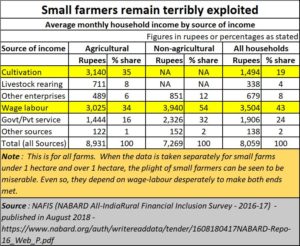
- Farmer distress is by now well known. There are enough stories about farmer suicides. There is enough evidence – even from Nabard – that the small farmer earns little from cultivation, and must often augment his monthly income through wages earned as a common labourer. Even schemes like the enacted WDRA (Warehousing and Development (Regulation) Act that got enacted in 2010 have yet to be given teeth (https://www.moneycontrol.com/news/business/economy/the-ghostly-organisation-that-should-have-transformed-indias-food-warehouses-2352429.html). That would have eased the distress that farmers face when selling their produce.
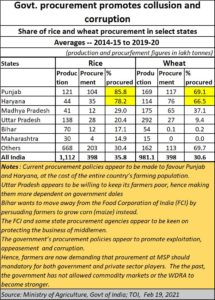
- As for the government argument that procurement can only be done by government agencies, the corruption, and the collusion, that government-owned procurement agencies (especially the Food Corporation of India) are known for, has compelled the farmers in North India to insist that procurement MSP shall be applicable to private traders as well. They know quite well the plight of small farmers when government agencies walk away, leaving them at the mercy of private traders who compel them to sell at distress prices ((https://asiaconverge.com/2021/09/need-sensible-laws-to-stop-farmer-exploitation/). Sadly, few people in the mainstream media have understood this.
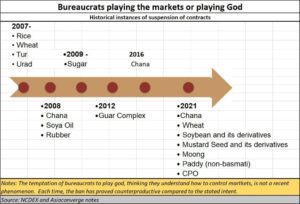
- The farmers have not even been allowed to become self-reliant. Futures have been banned in more commodities by this government than ever before. This has even prevented farmers from planning their cultivation based on futures prices (https://asiaconverge.com/2022/10/the-folly-of-banning-futures-trading-in-commodities/). The ban on exports – first on
- rice (https://indianexpress.com/article/explained/explained-economics/india-bans-exports-of-some-rice-explained-9004685/)
- wheat (https://timesofindia.indiatimes.com/business/india-business/govt-rules-out-lifting-ban-on-wheat-export/articleshow/100450885.cms),
- onions (https://timesofindia.indiatimes.com/business/india-business/onion-export-ban-to-continue-till-march-31-government/articleshow/107848351.cms)
- potatoes (https://www.business-standard.com/article/markets/ban-on-exports-hurts-potato-growers-115020601790_1.html)
- tomatoes(https://www.quora.com/Why-did-India-ban-tomato-exports-to-Pakistan).
- In the case of onions it turned bizarre as the government allowed onion exports selectively to Govt allows 54,760 tonne of onion exports to Bangladesh, Mauritius, Bahrain, Bhutan (https://indianexpress.com/article/business/commodities/govt-allows-onion-exports-to-bdesh-mauritius-bahrain-bhutan-9175955/). It is a stupid policy, because any savvy producer would get his friends to import larger quantities into these countries and then re-export them to other countries as well.
- Collectively, such practices have actually made the famer feel more vulnerable than ever before. Not surprisingly, the farmers have little option but to agitate. The reason why North Indian farmers have taken up the fight more aggressively is because they are close to Delhi and see political advantages as well. But the need for farmers to be heard is growing louder, and justifiably so.
The celebrations surrounding the 50th anniversary of Amul have raised discomfort levels to an unbelievable high. Farmers are furious. They feel betrayed. They have now begun to feel that they will never again to allowed to become self-reliant. This is contrary to everything Kurien believed in.
Maybe, that is why many legislators are uncomfortable with the memory of Kurien and his legacy. They have begun to feel that Amul and the milk industry should also forget him as quickly as possible.





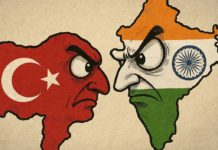























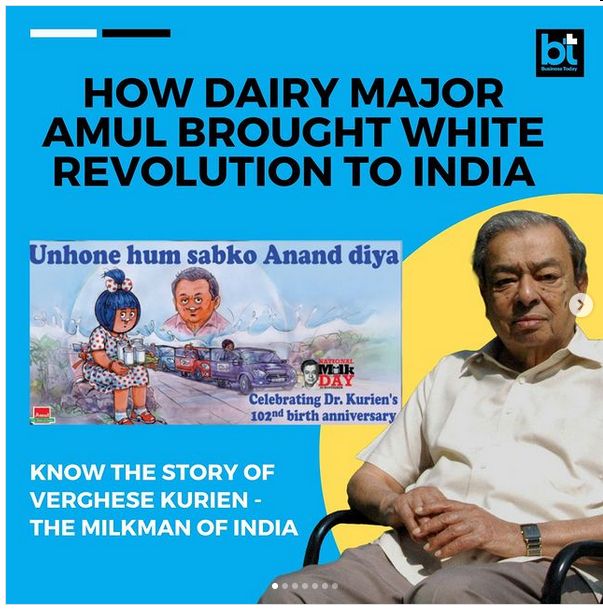






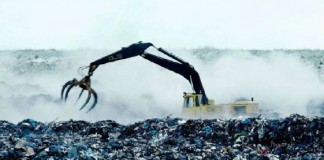
COMMENTS